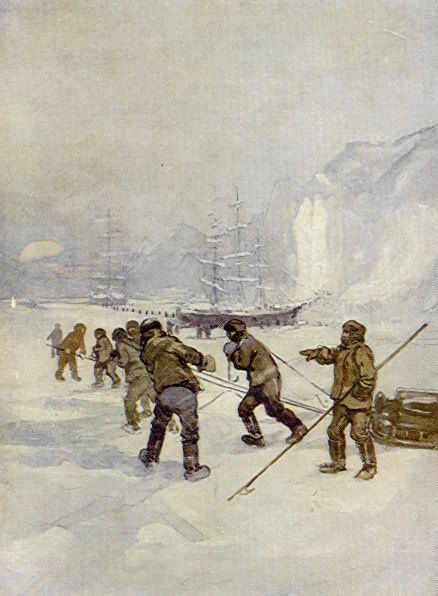



|
I
N days long, long ago, men knew very little of the world,
and all the countries it contained. But in the time of
The way to India and China is long, and, in the days when
there were no steamers, it was dangerous too. In the time of
King
For hundreds of years men struggled to find this
At last the British Government decided in
Sir John was no longer a young man, but he loved the sea and
the north, and he went out like an old
He sailed away with two ships, called the Terror and the
Erebus, manned by a hundred men and more.
The last

The ships were called the Terror and the Erebus. |
A year passed, then another. At home anxious hearts waited and waited for news, but no news came. Then, as nothing was heard of the ships and their gallant crews, both Sir John Franklin's wife and the British Government sent out expeditions to try to find the Terror and the Erebus.
These new ships sailed to the north, keeping as much as
possible in the course
But nothing was of any use. No sign of Franklin and his brave men could be found, although expedition after expedition was sent out. At one time as many as fifteen ships were looking for Franklin, but each one failed.
At last, after about twelve years, the searchers were
rewarded. They found a cairn in which was a tin can
containing a paper which had been put there by one of
None of the men ever reached home again. They all died of cold and hunger, and here and there along the way they had gone their skeletons were found bleached and white.
The people who live in the cold, far north are called Eskimos. When they were questioned, some of them remembered having seen white men travelling southward with a sledge. "But they were very thin," said one old woman, "they fell down and died as they walked."
The Eskimos had among them silver spoons and forks which the searchers knew had belonged to Sir John. These were all collected and brought home, but of the ships themselves nothing was ever seen.
All through the long search it was Lady Franklin who urged the explorers on, and when at last she knew that her dear husband was indeed dead, she raised a tomb to his memory in Westminster Abbey. She herself wished to write the words which were to be carved on the stone, but she died before they were written. The great poet laureate, Tennyson, wrote them instead.
|
Not here! The White North hath thy bones, and thou, Heroic sailor soul, Art passing on thy happier voyage now Towards no earthly pole. |
Although it is now known that there is a North-West Passage, it is also known that it can be of no use for trade. Even if the passage was not blocked with ice, the danger and suffering from the cold are too great to be endured.
There are still wonderful things to be learned in the cold,
white north, and there have been many Arctic expeditions
since the death of